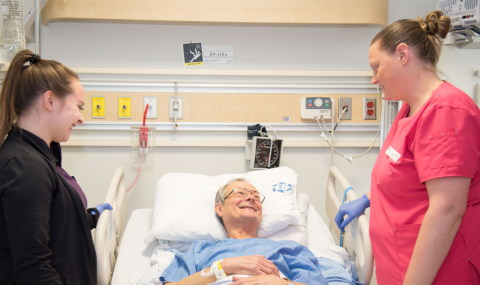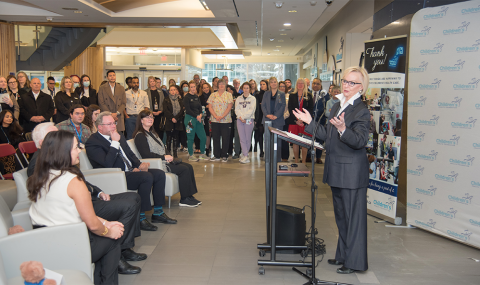September 30, 2020
The following message was shared with staff and physicians at London Health Sciences Centre earlier today:
Dear colleagues,
Along with many of you, I am angry and disheartened at the continued emergence of stories being shared about violence and discrimination faced by BIPOC (Black, Indigenous, and People of Colour) across the country.
I was particularly distressed to learn yesterday of the recent death of Joyce Echaquan, an Atikamekw woman who died in a Quebec hospital after sharing a live stream of what appears to be abusive and racist acts and behaviours by health-care professionals who were supposed to provide her care.
I am, quite frankly, outraged to know that Indigenous peoples continue to face this level of discrimination at the hands of those in our country who made a professional commitment to providing compassion and healing. Today LHSC lowers its flags to half-mast in memory of Joyce Echaquan. And today, I reiterate and strongly emphasize LHSC’s commitment and obligation to addressing systemic racism and inequitable access to health care at our organization.
For those who will see me in the halls today, you’ll see that I—along with several members of our senior leadership team—am wearing an orange shirt. This is to commemorate Orange Shirt Day, established in 2013 to draw attention to the story of Phyllis Webstad who, in 1973 as a six-year-old girl, was gifted a brand new orange shirt from her grandmother and was forced to remove the shirt and replace it with the uniform of the residential school she attended in British Columbia. Greatly impacting Phyllis’ mental and emotional wellbeing, this act, in her own words, symbolized “my feelings didn’t matter, how no one cared, and how I felt like I was worth nothing.” I encourage you to hear Phyllis’ complete story in her own words.
Nobody should ever feel the way Phyllis was made to feel. LHSC proudly and firmly supports the mission of Orange Shirt Day, which aims to create awareness of the individual, family, and community inter-generational impacts of Indian Residential Schools, promoting the concept that every child matters. Over the coming months, I look forward to sharing additional resources and initiatives that LHSC, in partnership with Atlohsa Family Healing Services, is undertaking on our journey to building a culturally inclusive environment for Indigenous partners, patients and colleagues including the opening of an Indigenous Healing Space.
In the meantime, I encourage you to continue your personal journey on Indigenous awareness to better inform your own reflections and approach to care. If you have not already done so, please consider reading the summary of the final report of the Truth and Reconciliation Commission of Canada. In this you will find 94 Calls to Action, of which I want to call your attention to one that we can collectively commit ourselves to addressing, No. 22: “We call upon those who can effect change within the Canadian health-care system to recognize the value of Aboriginal healing practices and use them in the treatment of Aboriginal patients in collaboration with Aboriginal healers and Elders where requested by Aboriginal patients.”
We can accomplish this. In the memory of Joyce Echaquan and all those who continue to be affected by pervasive and damaging attitudes, acts, and behaviours, we must accomplish this. Please join me in making a personal Pledge of Reconciliation with Indigenous Peoples, by solemnly pledging to:
- Learn more about Indigenous Peoples and issues.
- Continue to look forward to positive change for the situation of Indigenous Peoples.
- Find ways to address the Indigenous-related myths and misconceptions with my fellow Canadians.
- Not perpetuate stereotypes in my conversations and observations.
- Encourage others around me to keep reconciliation an ongoing effort.
- Read the TRCC’s 94 Calls to Action.
- Actively encourage ongoing support of National Indigenous Peoples Day every June 21 for myself, my family, and my community.
Today is a sad day, marked by another tragic and horrific story of an individual faced with what is a daily reality for many. Our society must end this treatment of Indigenous People, and LHSC must continue to stand up loudly and clearly against it. Today I remember Joyce Echaquan, I honour Phyllis Webstad, and I unequivocally underscore LHSC’s commitment to do and be better.
Dr. Paul Woods
President and CEO


